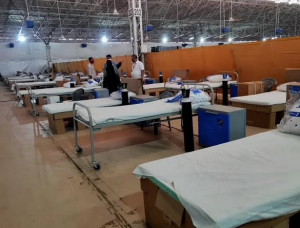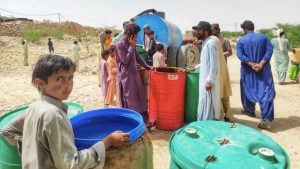As Balochistan is already reeling under the aftermath of heavy rains and floods, the number of cholera cases are once again on the rise in various districts in the province. The recent spell of torrential rains and floods had devastated vast areas, and flash floods compounded the problems. According to reports, several districts of Balochistan have reported dozens of cases of cholera, particularly affecting children.
This occurs when people have no supply of fresh water and end up consuming contaminated water to quench their thirst. In most areas of Balochistan where floods raged recently, almost all water sources have been badly affected by contamination. Several children have lost their lives and even adults are struggling to fetch fresh and potable water, as there is no such source left unaffected in their areas. Health facilities in those areas are under stress and they are running short of medicines and staff due to the recent calamity.
There is a need to provide fresh water supplies to these areas and for this the government machinery must spring into action at once before the situation gets out of hand. People need immediate medical attention and the authorities concerned must make sure that doctors and medicines are accessible round the clock to save lives. Cholera is a disease that quickly consumes human lives if proper treatment does not reach the patient in time. Across the border in Afghanistan too, at least 12 deaths have been reported out of over 18,000 infections in the outbreak of cholera since mid-June.
This is a public health emergency and must be taken seriously by all concerned authorities in both Afghanistan and Pakistan. Surprisingly, the Ministry of National Health Services has sent a team of just 12 doctors of the Pakistan Institute of Medical Sciences to Balochistan’s Lasbela district. There is a need to send more such teams to other districts of the province to provide medical treatment to the victims.
The Balochistan government must also set up medical camps in all flood affected areas; just dropping food is not enough. There should be qualified and trained physicians posted at least for the next couple months to counter any such outbreak of more diseases which are likely to erupt. More consignment of medicines should be on their way to reach there as early as possible. Other provinces should also be sending support and use all possible resources to provide the affected people with relief. Clean drinking water and hygiene kits are mandatory supplies to be distributed among the victims. 
Relief and rehabilitation in the flood affected areas must continue at a faster pace. Mobile health teams with doctors and paramedics should remain ready to reach and initiate their operations there. On a long-term basis, water treatment plants must remain functional in areas throughout the year with a capacity to generate thousands of litres of clean and safe water per day. Jerry cans and dengue kits should also reach these areas and households with relief materials. This may read like a long list of ‘must-dos’ but people’s lives are at stake and the usual apathy is not the answer.







